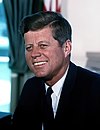1962 State of the Union Address
Lyndon B. Johnson
John W. McCormack
The 1962 State of the Union Address was given by John F. Kennedy, the 35th president of the United States, on Thursday, January 11, 1962, to the 87th United States Congress in the chamber of the United States House of Representatives.[2] It was Kennedy's second State of the Union Address. Presiding over this joint session was newly elected House speaker John W. McCormack, accompanied by Vice President Lyndon B. Johnson, in his capacity as the president of the Senate.
Kennedy began his speech with a tribute to former House Speaker Sam Rayburn who had recently died in office:
This week we begin anew our joint and separate efforts to build the American future. But, sadly, we build without a man who linked a long past with the present and looked strongly to the future. "Mister Sam" Rayburn is gone. Neither this House nor the Nation is the same without him.[2]
In this speech, Kennedy discussed his plans for the economy in response to the recent recession and threat of inflation. He also addressed the need for Congress to respond to certain domestic issues including pollution, education, mass transit, urban housing, civil rights, public health, and welfare assistance programs. On the side of foreign affairs, Kennedy spoke about the spread of communism through Asia and Latin America, his plan for Cold War diplomacy, and the importance of organizations such as the United Nations and the North Atlantic Treaty Organization in managing international affairs.[3] In closing his speech Kennedy described the United States' position as one of danger and struggle but reassured that the United States was ready to meet the challenge:
A year ago, in assuming the tasks of the Presidency, I said that few generations, in all history, had been granted the role of being the great defender of freedom in its hour of maximum danger. This is our good fortune; and I welcome it now as I did a year ago. For it is the fate of this generation—of you in the Congress and of me as President—to live with a struggle we did not start, in a world we did not make. But the pressures of life are not always distributed by choice. And while no nation has ever faced such a challenge, no nation has ever been so ready to seize the burden and the glory of freedom. And in this high endeavor, may God watch over the United States of America.[2]
References
- ^ "January 11, 1962: State of the Union Address". Miller Center. University of Virginia. Retrieved March 13, 2024.
- ^ a b c Kennedy, John F. (January 11, 1962). "Annual Message to the Congress on the State of the Union". The American Presidency Project. Retrieved March 13, 2024.
- ^ "State of the Union Address, 11 January 1962". John F. Kennedy Presidential Library and Museum. Retrieved March 13, 2024.
External links

- 1962 State of the Union Address (full video and audio at www.millercenter.org)
- v
- t
- e
- 35th President of the United States (1961–1963)
- U.S. Senator from Massachusetts (1953–1960)
- U.S. Representative for MA–11 (1947–1953)
(timeline)
- Transition
- Inauguration
- Cabinet
- Judicial appointments
- Executive Orders
- Presidential Proclamations
- Presidential pardons
- Presidential limousine
- Presidential yacht
- Resolute desk
- Situation Room


speeches
- U.S. House of Representatives elections: 1946
- 1948
- 1950
- U.S. Senate elections in Massachusetts: 1952
- 1958
- 1960 presidential primaries
- 1960 presidential campaign
- Democratic National Conventions: 1956
- 1960
- U.S. presidential election 1960
- Birthplace and childhood home
- Kennedy Compound
- Hickory Hill
- Wexford
- Navy service: PT-109
- PT-59
- Castle Hot Springs
- Hammersmith Farm
- Coretta Scott King phone call
- "Happy Birthday, Mr. President"
- John F. Kennedy document hoax
- Why England Slept (1940)
- Profiles in Courage (1956)
- A Nation of Immigrants (1958)
namesakes
- Harvard Kennedy School
- Kennedy Center for the Performing Arts
- John F. Kennedy Federal Building (Boston)
- John F. Kennedy International Airport
- Boston statue
- Brooklyn memorial
- Dallas memorial
- Hyannis memorial
- London memorial
- Portland memorial
- Runnymede memorial
- John F. Kennedy Arboretum
- John F. Kennedy Memorial Bridge
- John F. Kennedy Special Warfare Center and School
- John F. Kennedy University (defunct)
- John F. Kennedy Stadium
- Kennedy Expressway
- Mount Kennedy
- MV John F. Kennedy
- USS John F. Kennedy (CV-67)
- USS John F. Kennedy (CVN-79)
- Yad Kennedy
- Jacqueline Bouvier (wife)
- Caroline Kennedy (daughter)
- John F. Kennedy Jr. (son)
- Patrick Bouvier Kennedy (son)
- Rose Schlossberg (granddaughter)
- Tatiana Schlossberg (granddaughter)
- Jack Schlossberg (grandson)
- Joseph P. Kennedy Sr. (father)
- Rose Fitzgerald (mother)
- Joseph P. Kennedy Jr. (brother)
- Rosemary Kennedy (sister)
- Kathleen Cavendish, Marchioness of Hartington (sister)
- Eunice Kennedy Shriver (sister)
- Patricia Kennedy Lawford (sister)
- Robert F. Kennedy (brother)
- Jean Kennedy Smith (sister)
- Ted Kennedy (brother)
- P. J. Kennedy (grandfather)
- John F. Fitzgerald (grandfather)
- Pushinka (dog)
 | This article related to the politics of the United States is a stub. You can help Wikipedia by expanding it. |
- v
- t
- e












